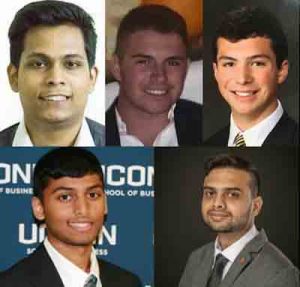A team of Stamford-based UConn business graduate students won the highly competitive 2021 Bloomberg Global Trading Challenge, topping almost 500 teams from around the world.
The winning team credited its success to a professor’s advice to make smart and bold decisions, an investment strategy that identified underdog companies that were responding to market demands, and their UConn education that prepared them for thorough assessments of prospective investments.

Their trading portfolio surpassed a Bloomberg benchmark by $467,961. The UConn team beat second-place winner Prince Sultan University in Saudi Arabia by more than $100,000.
The UConn student investors prevailed despite a glitch early in the seven-week competition that prevented them from accessing all of their $1 million in virtual investment funds, while other competitors had access to the entire cash portfolio.
The team, composed of graduate students in the Financial Risk Management (FRM) program in Stamford, included team leader Sayem Lincoln and members Jayabhushan Nallakannu and UConn alumni Varun Katari ‘21, Justin Keish ‘21 and Matt Ciaburro ’21, who are in a 4+1 bachelor/master’s degree program. The team adviser is finance professor Michel Rakotomavo.
“We are very proud of these students. To win the grand prize in a global competition, surpassing outstanding teams from across the world, is an outstanding achievement,’’ says Professor Chinmoy Ghosh, head of the Department of Finance.
“The team was inspired not only by their classes, but by their professors who encouraged them to take their knowledge and apply it in the competition. Employing an investment strategy that involved bold and carefully monitored risks and a sharp focus on the changing market, the team invested in a diversified portfolio of stocks ranging from vaccines to cryptocurrency,’’ Ghosh says. “These students will certainly continue to achieve tremendous results while at UConn, and later in their careers.’’
From Day One, The Goal Was to Win
The five students were acquaintances, seated near each other in professor Yaacov Kopeliovich’s FRM 5315 financial-risk course, when he told them about the competition. They spontaneously formed a team.
“From Day One, the goal was to win. It was win or bust,’’ Lincoln says. The strangers quickly became friends with frequent group meeting and almost constant strategizing and calls. The team’s lowest ranking was No. 34 during the first week.
Lincoln says their strategy was focused on a broad spectrum of investments from vaccines to tech companies. “Whatever the market was reacting to, we had a slice of the pie,’’ he says. “ The team defended its position for three weeks at the top and faced competition from global teams ranging from Saudi Arabia to China to the United Kingdom.’’
Keish says the team was a great mix of people who met mostly by luck but shared a common motivation and drive.
“We tried to follow different sectors and avoided the big names that everyone else was using. Everyone did what we had to in order to find those underdog companies that were going to lead us to success,’’ he says.
“Sayem had all the confidence in the world that we were going to win. At first I thought, ‘C’mon man. There are 500 teams!’ But when Week 2 rolled around and we were in third place, it seemed possible,’’ Keish says. “We just turned on the jets!’’
“We are extraordinarily proud of this team. They committed to winning the challenge from Day 1, and devoted a tremendous amount of time, energy, and thoughtful strategy into doing so!,’’ says School of Business Dean John A. Elliott. “Their success reflects not only the quality of their financial education at UConn but also the drive, intelligence, and competitiveness of the students we serve.’’
FRM Program Draws Those with Entrepreneurial Spirit
“This is a very prestigious competition,’’ Rakotomavo says. “I was elated for everyone. This team is brilliant and to beat teams from all over the world, from well-renowned universities, was no small feat. This is a great achievement.’’
Rakotomavo credits Kopeliovich with inspiring the students to go above and beyond. “He not only knows his stuff, he gets students excited about their work both in the classroom and beyond. He has incredible energy and enthusiasm. The FRM program is lucky to have him among us.’’
Kopeliovich couldn’t be more pleased with his students’ triumph.
“It is an incredible achievement,’’ he says. “They selected highly speculative stocks with strong potential. I think this is one of the brightest achievements at the School of Business in recent years. What I tell my students is that they need to take more chances. In our FRM program we see students, like these, who have a strong entrepreneurial spirit.’’
The UConn team found out about its first-place finish on Nov. 23 but the members had already scattered for the Thanksgiving holidays. They are planning a night of celebration in the near future.
“Our team often had different opinions but we always concluded what was best for the team going forward. Our decisions were very democratic. We worked perfectly together. Our goal was to win and we did anything and everything to achieve that goal,’’ says Lincoln, who hopes to work as a trader after graduation. He completed his undergrad degrees in computer science and engineering and economics at Michigan State. He chose the UConn FRM program because of its reputation and strong business connections.
“I would say we wouldn’t have won if we didn’t all contribute equally,’’ Lincoln says. “The team really came together and came through. This was the best team I could have asked for and if I were to do it again, I wouldn’t change a thing.’’
Keish says he would encourage all UConn students to step out of their comfort zone and push themselves to try something new.
“My advice to other students is to try something, challenge yourself. It can’t hurt,’’ Keish says. “One team from a college in Italy reached out and they want to meet us. A competition like this opens your network to the whole world. Take advantage of this kind of opportunity if you’re given it.’’



